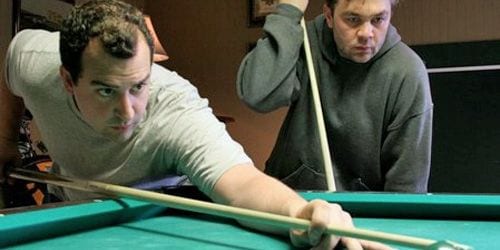
As The Do-Deca-Pentathlon begins, siblings Mark (Steve Zissis) and Jeremy (Mark Kelly) are deeply estranged. Mark offers one possible explanation to his wife Stephanie (Jennifer Lafleur) in an opening scene: Jeremy once defecated in the bath while sharing it with Mark. This scatological tableau sums up the childhood relationship the brothers spend the rest of the film either denying or trying to recapture. It’s intimate, mischievous, and certainly gross, but where Mark reads the act as one of psychological torment, it becomes clear that the child Jeremy intended it as a gesture of confused fondness.
“There’s no love lost,” says Jeremy concerning his own feelings for his brother. “We just can’t find it right now, we’re looking for it.” It’s a joke line, and also reflective of the film’s subtle emotional complexity and integrity. The latest film from Jay and Mark Duplass, The Do-Deca-Pentathlon might be read as an inverted narrativization of the dangerous energies of sibling rivalry that they’ve apparently subverted into a creative collaboration. It’s certainly quite astute regarding the fraternal competitiveness gene, as well as the emotional aftershocks this gene produces.
The primary manifestation of Mark and Jeremy’s relationship is the titular sporting competition, a 25-event Olympian expression of their struggle to best one another that was resolved unsatisfactorily in their youth and has therefore been transmuted into other forms in adulthood.
Both brothers are dissatisfied with their respective life paths and envy that of the other, the pursuit of happiness just another event in their never-completed competition. Mark feels stifled and sedentary, hemmed in by his wife’s influence and his psychologist’s diagnosis of excessive stress. Though he never admits it (Zissis makes beautifully clear both Mark’s stubborn internalization as well as his bursts of adrenalized agitation), he covets Jeremy’s flashy lifestyle and bachelor’s freedom. At the same time, Jeremy feels lonely and aimless and looks up to his older brother’s responsibility and his settled, essentially loving family unit, wishing above all to be admitted into it.
This unit includes Mark and Stephanie’s sullen, sarcastic son, Hunter (Reid Williams). The teenager exacerbates the brothers’ contest by finding his dad to be a hopeless, insincere square, and connecting more directly with the immature, freewheeling Jeremy. He sees in his uncle’s professional poker “career” and impish persona a model that is far more exciting than the staid Mark’s hilariously bourgeois profession of “pet food consulting and marketing.”
When Mark and his family travel to visit his mother (Julie Vorus) at their childhood home on his birthday weekend, Jeremy decides to act on both his resentful impulses and his desire for re-attachment by crashing the gathering. He injects himself into a family fun run (which the reluctant participant Hunter dubs a “suck run”) and rekindles the competitive edge in Mark, racing him to the finish line. The Duplasses play up the faux glory of two doughy middle-aged white guys striving against each other, employing amusing slow-motion and snatches of an Olympic-style drums and brass score over their energetic efforts.
Although Mark continues to treat Jeremy with dismissive disdain at the modest ancestral manse, the younger brother succeeds in activating some dormant athletic spark in the elder. When Jeremy proposes re-commencing and finally completing the long-unresolved “Do-Deca” competition over the course of the weekend, Mark cannot resist. With the connivance of Hunter in evading the unrealistic disapproval of Stephanie (Lafleur manages to invest this stock role with convincing care and concern), the brothers contend against each other on various sporting grounds as they have in their lives thus far. As they’re plainly well practiced, their contests are at once awkward and sympathetic. Kelly’s performance offers particular details toward both effects, as his eyes appear always on the point of dejected tears, but still sparkle with fiendish intention when the games begin.
The brothers’ vivid emotional interrelations — in the screenplay and embodied by the actors — mostly overcome the film’s related weaknesses of a restrictive budget and insufficient ambition, but not entirely. The Do-Deca-Pentathlon (shot entirely in faceless suburban New Orleans) sometimes looks frustratingly and distractingly cheap. A clumsy game of laser tag, for example, brings to mind a couple of producers pooling the cash in their wallets to cover the entry fee of not only four actors, but of camera and sound men as well.
But the Duplass brothers mostly succeed at providing a complicated, recognizable portrait of the emotional implications of sibling rivalry. For every feint in the direction of low-budget comic silliness in The Do-Deca-Pentathlon, there’s a more committed turn towards poignant honesty.

![Call for Papers: All Things Reconsidered [MUSIC] May-August 2024](https://www.popmatters.com/wp-content/uploads/2024/04/all-things-reconsidered-call-music-may-2024-720x380.jpg)



